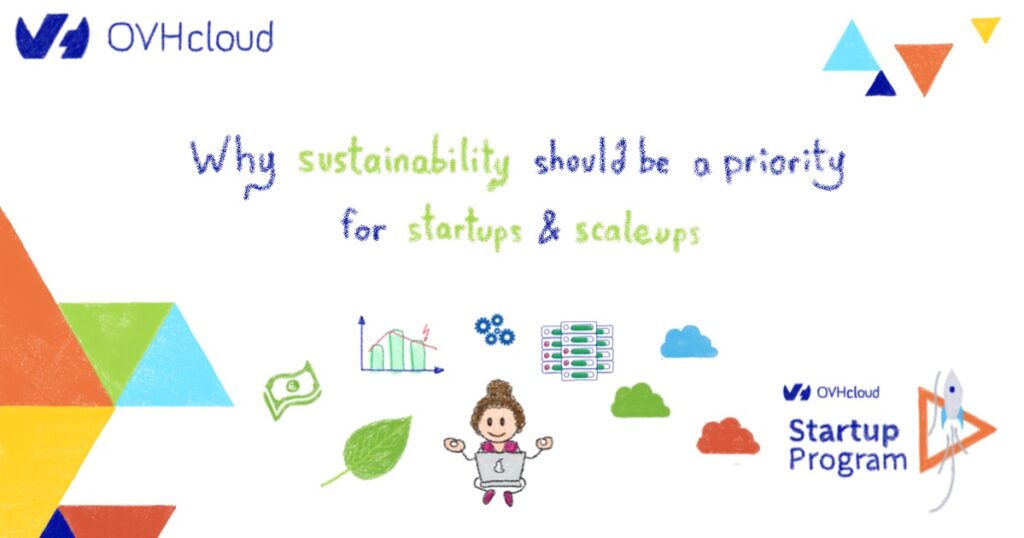Sustainability has become an increasingly important global issue in recent years. According to the European Commission, over two-thirds of Europeans consider climate change to be a serious problem, and almost 60% believe that it is one of the most pressing issues facing the world today.
For modern businesses, sustainability is crucial because it affects all aspects of growing and running the firm, including how customers, employees and investors see and value them. By integrating sustainability into their operations, leaders can set their business up for long-term success and create opportunities for innovation and growth, whilst also addressing important social and environmental issues.

Many startups have seized this opportunity already. According to the Global Entrepreneurship Monitor (GEM) in 2020, over 60% of startups in the United States and Europe consider sustainability to be an important factor in their business operations.
Establish a sustainability strategy from the start
As a startup, it can be tempting to focus on achieving financial success via the usual methods. However, it is important to consider sustainability early in the journey, because factors such as your carbon footprint, brand values and implementing sustainable supply chains can all have a significant impact on both your company’s long-term financial viability and its reputation.
Adopting a formal sustainability strategy – also known as Environmental, Social, and Corporate Governance (ESG) – is the best way to ensure success. Shân Millie, Data & Tech-Enabled Value Generation expert at Bright Blue Hare, believes a startup business plan must incorporate ESG readiness from the beginning. She says:
“It is no longer possible to separate financial success from either the societal context in which the firm operates, or the societal impacts of what it does, sells, makes or invests in. Startups need to understand, anticipate and meet the expectations of the established firms they need as partners, investors, clients – those who build as ‘ESG ready’ will have significant advantages over those playing catch-up”.
4 good reasons to adopt a sustainability strategy
Cost Saving

Sustainability and cost savings are closely connected, as efforts to be more sustainable often involve reducing waste and increasing efficiency, which can result in cost savings. For example, implementing energy-efficient practices or using sustainable materials can lead to lower energy bills and reduced waste, saving your company money in the long run.
Credentials

Both consumers and talent are keen to find companies that prioritize sustainability. In addition, TotalJobs recently found that 60% of UK job hunters research a potential employer’s sustainability commitments before accepting a position, so incorporating sustainable practices can help to improve your company’s reputation and attract customers, new talent and funding.
ESG Requirements
Although startups (of a certain size and turnover) might not be required to report their environmental practices to regulatory agencies, their investors might require this information. In the long term, it is expected that non-financial reporting will be a necessary part of winning new business for suppliers to larger companies. Therefore, it will become increasingly important for these suppliers to effectively manage their relationships with their larger customers, who are required to report on non-financial information. Differences in ESG reporting frameworks remain between US, UK and EU, but the regulation landscape is changing quickly. You need to be ready to be compliant and ESG-ready for any markets that are important to you.
Investors
Companies with green credentials are increasingly attractive to investors, with climate impact often among the criteria investors use to assess suitability. CNBC recently reported that global sustainable funds reached record highs in 2020, with over $51 billion in new investments – more than double the previous record set in 2019.
Simple steps to get started
There are several ways for startups to make positive changes for the environment – and cut costs too. These may include switching to a paperless system, providing bike vouchers to commuting employees, recycling and properly disposing of waste, and turning off unused devices and lights in the office. These actions can not only help to protect the environment, but also reduce costs for the organisation.
Think about establishing clear and achievable objectives to improve sustainability. This can include anything from eliminating single-use plastic, setting a minimum number of hours for team members to volunteer for environmental causes, or setting aside a certain percentage of revenue for sustainable initiatives. It’s important to set goals that are realistic and achievable, as this can help to ensure that progress is made towards improving sustainability in a meaningful way.
Selecting the right suppliers is an effective way for businesses, including technology companies, to improve their sustainability. Even if a tech company does not manufacture or sell physical products, there are still opportunities to make positive changes in the supply chain. It’s important to consider the environmental impact of all products and services offered, including financial services, recruitment, equipment, and refreshments. Tech businesses can demonstrate their commitment to sustainability by partnering with suppliers that align with their values and are taking steps to become more environmentally friendly. This can help to reduce the overall environmental impact of the business and send a clear message about the company’s priorities.
Where does choosing the right cloud provider fit in?

The cloud has the potential to significantly reduce the energy and resources needed for computing, but it is important to choose a provider that uses renewable energy, has a commitment to sustainability and disclose its data. Not only is this good for the environment, but it can also help to reduce costs and improve the resilience of your business. By choosing a sustainable cloud, you can reduce your carbon footprint and play a role in combating climate change.
The last word
In summary, sustainability should be a priority for startups. Incorporating sustainable practices can help to reduce costs, improve efficiency, and contribute to a positive social and environmental impact. By considering sustainability early in the journey, startups can set themselves up for long-term success and a more sustainable future.
At OVHcloud we are truly committed to offering a sustainable and affordable cloud. Our datacentres are built on sustainable water-cooling technology, and we have full control of our supply chains. Discover more about our unique approach here.
Want to learn more about the cloud and sustainability? Why not attend our FREE webinar! Learn more here. We hope you join us for the discussion on 15th February!
As a startup, one of the best ways to benefit from the cloud is to join a cloud provider startup program. These programs often offer free credits to access cloud solutions and support. As a leading European cloud hyperscaler with 20 years in the industry, OVHcloud offers a well-established startup program. Read more about the OVHcloud Startup Program.

Start-Up Program Manager
UK & North Europe Cluster
OVHcloud
